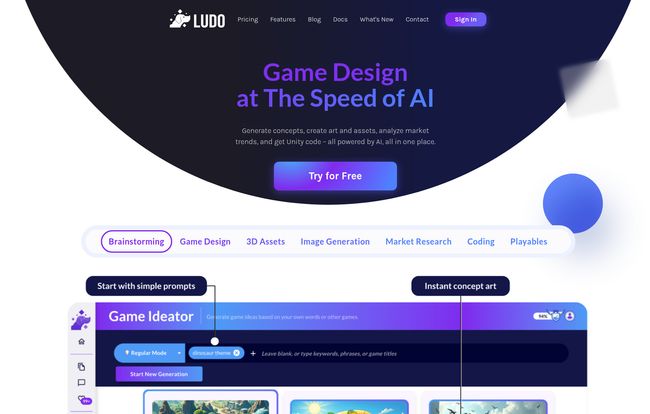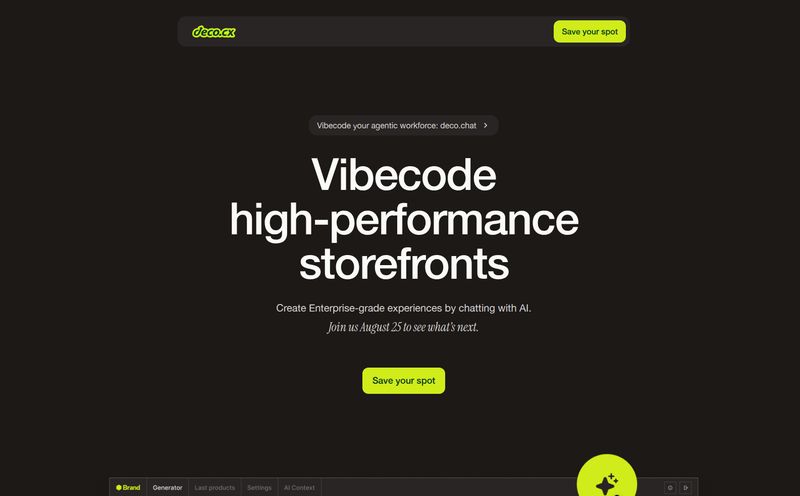I’ve been in the digital trenches for years, watching trends come and go. I’ve seen SEO tactics rise like phoenixes and die like… well, like last year’s memes. But every once in a while, something pops up that makes me lean in a little closer to my screen. Lately, that something has been the explosion of AI tools, and the one that’s been lighting up my gamedev forums and Discord channels is Ludo.ai.
If you've ever tried to make a game, you know the feeling. The sheer excitement of a new idea, followed swiftly by the crushing weight of the thousand tasks ahead. You're not just a designer; you're a writer, a market researcher, a programmer, an artist, and a project manager. It's a lot. And that blank page, whether it's in a script, a design doc, or a fresh Unity project, can be absolutely terrifying.
So when a platform comes along claiming it can 10x your productivity by acting as your AI-powered co-creator, my skepticism-meter goes off the charts. But so does my curiosity. I had to see for myself if Ludo.ai was just another shiny object or a genuinely useful tool for creators.

Visit Ludo.ai
So, What is Ludo.ai, Really?
Forget the corporate jargon for a second. At its heart, Ludo.ai is like a Swiss Army knife for game developers, powered by AI. It’s not just one thing. It's a collection of tools designed to tackle some of the most grueling parts of game creation. Think of it less as a single button that spits out a finished game (we're not there yet, thankfully) and more like a brainstorming partner who’s also a data scientist, a concept artist, and a junior programmer all rolled into one.
It aims to be an ecosystem that helps you from the very first spark of an idea—that “what if?” moment—all the way to creating playable prototypes and figuring out if anyone will actually want to buy your game. It’s ambitious, I’ll give it that.
Breaking Down the Toolkit: My Favorite Features
I messed around with the platform for a while, and a few features really stood out. Some were game-changers, others were just… neat. Here’s the stuff that got me excited.
The Game Ideator and Concept Tools
This is where it all begins. Creative block is real, and it’s a killer. Ludo’s Game Ideator is designed to combat this head-on. You can feed it a simple prompt, a genre, a weird mechanic you thought of in the shower, and it will generate a slew of game concepts. Are they all gold? Of course not. Some are downright bizarre. But that’s the point of brainstorming! It throws spaghetti at the wall so you can see what sticks.
I typed in “a cozy farming sim but with mischievous cats who are also wizards.” The results were pretty impressive, giving me core mechanics, potential story hooks, and even monetization ideas like selling different styles of wizard hats for your cats. It’s this kind of creative kickstart that can save you days of staring at a blank document.
From Concept to Code: The Unity Connection
Now this… this is the part that made my jaw drop a little. Ludo.ai has a feature that generates C# code for Unity. Let me say that again. It writes code. You can describe a game mechanic, and it will generate scripts for you. For an indie dev who might be a great artist but a so-so programmer (or vice-versa), this is huge. It's not going to code your entire complex RPG system for you, but for generating boilerplate code, prototyping a new movement system, or creating simple interactions? It’s a massive time-saver. As with any AI-generated code, you absolutely need to understand it, debug it, and probably refactor it. But as a starting point, it's pretty incredible.
Market Trends and That “Ludo Score”
Here’s where my SEO and traffic-gen brain really lit up. Creating a game is one thing; selling it is another beast entirely. Ludo.ai has built-in market research tools that analyze current trends on platforms like Steam. It can show you what genres are hot, what art styles are trending, and what features players are responding to. It even gives your game concept a “Ludo Market Score,” which is its AI-driven estimate of your idea’s market potential. I take any automated score with a grain of salt, but the underlying data is solid. It forces you to think about your audience and positioning from day one, which is something so many developers (myself included) have learned the hard way.
Let's Talk Money: The Ludo.ai Pricing Tiers
Okay, the all-important question: what’s this gonna cost me? Ludo.ai runs on a subscription model with a few different tiers, and it uses a credit system for some of the more intensive features. Here’s a quick breakdown as I see it.
| Plan | Price | Best For |
|---|---|---|
| Free Trial | Free | Everyone. Seriously, just try it. You get 30 credits to kick the tires. |
| Indie | $15 / month | Solo devs and hobbyists who are serious about a project. |
| Pro | $30 / month | Serious indie developers or small teams who need unlimited ideation and more credits for bigger tasks. |
| Studio | $80 / month | Professional studios that need multiple seats and real-time collaboration features. |
The credit system is the main thing to wrap your head around. Basic ideation and searching are often unlimited on the paid plans, but more complex tasks like generating a playable prototype or high-quality 3D assets will consume credits. This is pretty standard for AI tools that use a lot of computing power. The Pro and Studio plans give you a generous 1000 credits per month for the heavy lifting.
The Good, The Bad, and The AI-Generated
No tool is perfect. Let's be real. Ludo.ai is powerful, but it's not magic. The biggest pro is speed. It can take weeks of research and brainstorming and condense it into a few afternoons. For a solo dev, that's priceless. The market analysis and Unity integration are genuine game-changers.
On the flip side, the main drawback is that it’s still AI. The content it generates—whether it’s an image, a game concept, or a block of code—is a starting point. It requires a human touch, a discerning eye, and a creative mind to refine it into something truly special. You can’t just blindly copy-paste and expect a masterpiece. The credit system can also feel a bit restrictive on teh lower tiers if you're heavily using the fancier features.
Who Is This Tool Actually For?
After playing around with it, I have a pretty clear idea of who gets the most out of Ludo.ai.
- Solo Indie Devs: This is the sweet spot. If you're wearing all the hats, Ludo.ai can be the partner you desperately need. It fills in the gaps in your skillset and saves you an immense amount of time.
- Game Jam Participants: The ideation and prototyping features are perfect for the tight deadlines of a game jam. You can get a concept and a working prototype up and running way faster.
- Creative Studios: For larger teams, the Studio plan's collaboration features make it a powerful brainstorming and pre-production tool. It can help get the whole team aligned on a concept before sinking major resources into it.
Who is it not for? Probably the hardened veteran who already has a deeply ingrained, efficient workflow and a full team. But even then, I’d argue the market research tools alone are worth a look. It’s easy to get stuck in our own creative bubbles.
Frequently Asked Questions
- Can Ludo.ai completely replace a game designer?
- Absolutely not. It's a tool, an assistant, a co-pilot. It generates ideas and data, but it lacks the human experience, taste, and empathy to make the final creative decisions. It augments a designer, it doesn't replace them.
- How good is the AI-generated Unity code?
- It's surprisingly decent for simple mechanics and boilerplate stuff. But it’s not going to architect a complex, scalable system. Think of it as a helpful junior coder. You need to review, test, and integrate its work properly.
- What are Ludo.ai credits and how do they work?
- Credits are like tokens you spend on computationally expensive tasks. Things like generating a 3D model, a playable build, or a full game design document will cost credits. Simple searches and ideation usually dont on paid plans. The number of credits you get depends on your subscription tier.
- Is the free trial actually useful?
- Yes, definitely. It gives you 30 credits, which is enough to try out most of the core features and see if the workflow clicks for you. It’s a no-risk way to see what all the fuss is about.
- Can I use the assets generated by Ludo.ai commercially?
- This is a big one. As with most AI platforms, you should always check their most current terms of service. Generally, paid plans on these types of platforms grant you commercial rights to the assets you generate, but it's your responsibility to ensure they don't infringe on existing copyrights. The legal landscape for AI art is still new, so proceed with awareness.
My Final Verdict on Ludo.ai
I came in skeptical, and I'm walking away… impressed. Genuinely. Ludo.ai isn't a magic wand that will create a hit game for you. But it is an incredibly powerful catalyst. It accelerates the most difficult parts of the creative process and provides data to back up your gut feelings. It democratizes game development, giving smaller creators access to tools and insights that were once the exclusive domain of giant publishers.
Is it the future of game design? I think it’s a big part of it. The future isn't AI doing everything for us. It’s us, the human creators, working with AI to build bigger, better, and more interesting worlds than we ever could alone. And that’s a future I’m excited about.



